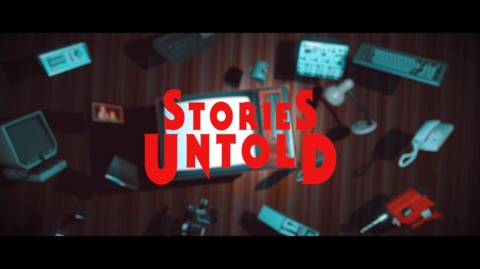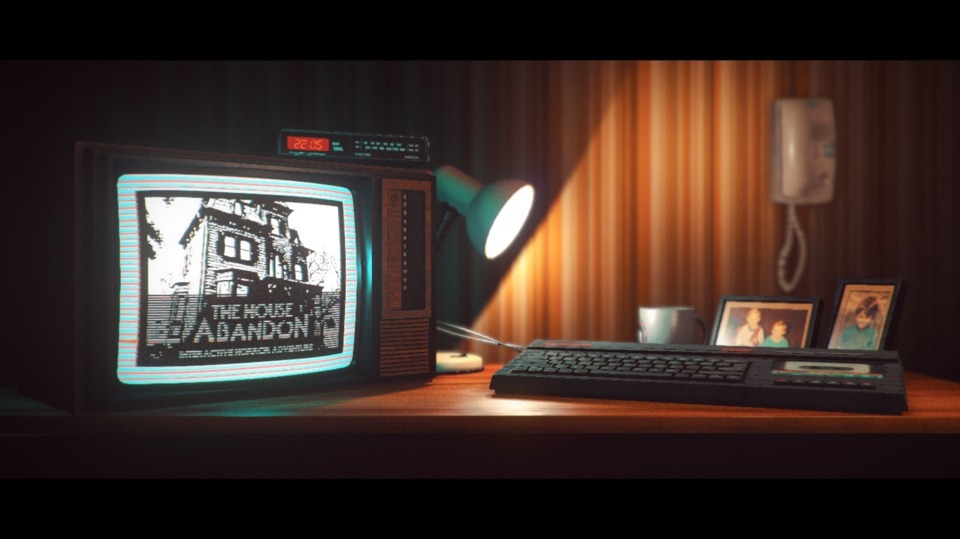Indie Game of the Week 42: Stories Untold
By Mento 3 Comments

We're a week and change away from the new season of Stranger Things, but it turns out the Duffer Brothers aren't the only ones interested in artifacts of the 70s and 80s and their capacity to still scare us. Stories Untold, from Scottish developers No Code, is a series of little text adventure games that take place in various settings, from a creepy house to a classified laboratory to a remote numbers station in the frozen tundra. The only connective tissue between the four episodes is a parser interface usually depicted on an ancient computer, but the game frequently draws in the surrounding environment as part of their narratives. You're not so much staring at a computer screen but a whole desk, with its various accoutrements, while interacting with the keyboard controls as various changes occur both on the screen-within-a-screen and everything around it. It's a little easier to demonstrate than explain, but the game builds its horror through these "external" changes affected by your inputs, ramping up the unease of their isolated settings in the process.
The core of the game, which is to say what the player is doing when they aren't getting spooked by circumstances beyond their control, is following a set of instructions that changes with each episode. In the first episode, you're playing a classic text adventure game on a system similar to a Commodore 64 where the events in-game appear to be reflected in the "real world" belonging to the console and TV. The second involves carefully setting up and executing experiments, fiddling with machines and settings to match those laid out on the monitor by the scientists in the adjacent room. The third has you intercepting radio signals and conferring with a microfiche readout to input three lines of code for each radio broadcast. Each episode's tasks increase in complexity, often requiring some puzzle-solving and point-and-click experimentation, and each involve a little self-contained story with a sci-fi/horror twist at the end. It's a cool idea for an anthology series, with only a few characteristics to serve as a connective tissue (mostly just the old computer interfaces and that 70s/80s era vibe), that's often less about following instructions to the letter but following the narrative thread to where it eventually leads.
Unfortunately, the game runs like garbage on this laptop. I'm not sure why. The whole core of the game's premise is that we're not dealing with sophisticated hardware; rather, those of several decades past which predate mouse controls. The 3D environments are highly detailed, but extremely limited, insofar as that you rarely leave the respective desks of each episode. What's worse is that it creates this huge delay to all the inputs, which makes certain steps in the process - like twisting a dial to meet a high frequency in the second episode's science experiments - take upwards of several minutes. Whenever the game presents a wall of text, each letter pops in after about half a second each, which leads to excruciatingly long waiting times for each room's descriptive flavor text during the text adventure section. If you choose to "exit" or "go to" another room and come back, you see the same text again, and the game refuses to let you skip ahead to a fully finished page. It's apparently super important you see every character pop into existence one at a time, and what should be a ten minute exercise in spookiness instead takes closer to an hour.

Worst of all, this delay seems to cause a game-breaking bug in the third episode which makes it impossible to continue. After inputting one trio of codes, the screen moves to a "sending" screen which then segues to the next frequency you need to find on the radio, but because the "successfully sent" screen with all its check boxes takes so long, it skips the next frequency and drops back to a neutral screen that depicts where all the number stations are located. Since you don't know what the next frequency is, and don't have an on-screen input to insert the next code you get from the radio station, there's no means to proceed.
It's rare that I meet circumstances like this in Indie games. Most are built in such a way that they offer low-end PCs an opportunity to run more smoothly with lower graphical settings, but even on this game's lowest settings I encounter all the same issues. Indie developers shouldn't be compelled to include low-end settings - it's more work that they usually neither have the time nor manpower to perform as a small studio with overhead to pay - but it's highly irregular when your game is supposed to be a lo-fi callback in the first place. As it is, I cannot continue the game, and have no real motivation to fix or get around this issue in case another just like it emerges in the fourth and final episode. (I've also spoken about this in a previous review, though I don't recall which one, where real glitches in puzzle games that play around with fake glitches as part of their narrative is a REALLY big problem. There's no way to tell if it's genuine or one the game is fabricating.)
It's a bit of a shame, because I was enjoying the atmosphere of these thoughtful text adventure games and their refusal to speak down to the player (unless they take too long, at which point there might be a helpful reminder or two of what they should be doing), but these issues have greatly soured any enjoyment that might be derived from them. I can only review my own experience, so please don't take the result as gospel: in an ideal world, this game involving 50kg beige CRTs and fake C64s would run smoothly on a system made in the 2010s, rather than a jerky mess that moves like molasses.
Rating: 2 out of 5.
| < Back to 41: Child of Light | > Forward to 43: Driftmoon |
